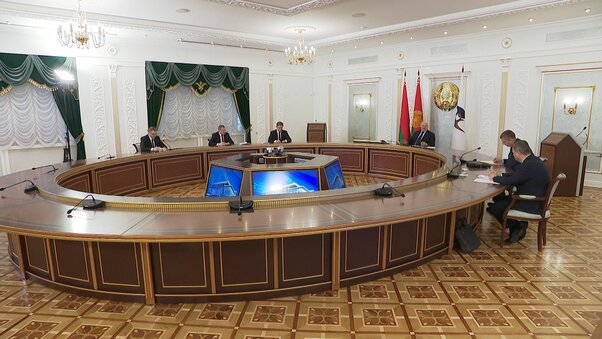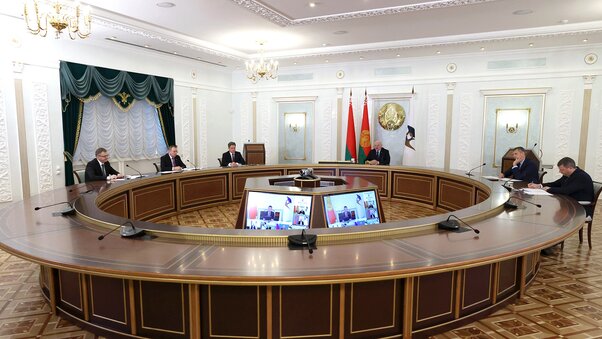Meeting to discuss social and economic policy matters
- 22
- 12:29
The bill on the improvement of Belarus’ socio-economic policy was submitted for discussion to Belarusian President Aleksandr Lukashenko.
“Let no one be surprised that we are holding such a big meeting. It is just that the government is making a number of big proposals,” the head of state said.
The President recalled that after the adoption of the new Constitution, laws became the main legal acts in Belarus.
“The government has prepared a bill setting forth new approaches to running the economy for the period of a year and a half. I know that government agencies and the authors of the document hold different, sometimes polar views on certain provisions. Therefore, before submitting this bill to the parliament, we have invited the interested parties to this meeting in order to make a final decision on controversial points,” Aleksandr Lukashenko said.
"Domestic enterprises have faced the barriers artificially created on the external contour. They have affected all stages of the production process: the purchase of raw materials, transportation, settlements, finance, credit support, and export. I remind you that difficulties are not a reason to panic, but one should not expect that the situation will resolve on its own," Aleksandr Lukashenko stressed.
The head of state noted a decrease in sales of potash and petroleum products. These two positions (their share at 13%) impacted the overall performance of the industrial complex. "It should be noted that these are extremely important goods for the world market, the prices for which have gone up tremendously," the President said.
The situation with the export of potash and petroleum products also had a negative impact on the transport industry and wholesale trade. Other sectors of the Belarusian industry operate at 100% and higher. "I am sure that we will settle the difficulties with both oil and potash fertilizers," Aleksandr Lukashenko said.
“The law is the law, but in the current situation we will have to transport potash ‘in bags’ or diesel fuel ‘by barrels’. We have to roll up our sleeves and work properly on every contract we have. Everyone, from specialist to prime minister, should be involved in the work and the President will join in when necessary,” Aleksandr Lukashenko said.
The head of state asked the participants of the meeting how the proposed law would help specific enterprises, namely, Naftan, into modernization of which the country invested over $1.5 billion and constantly supports the company’s personnel in all the matters. The same concerns Mozyr Refinery and Belaruskali.
“No one will help us but ourselves. All reserves for growth and development we have to look for in ourselves. There is a sea of them, even in these difficult conditions,” the Belarusian leader stressed. Therefore, I would like to hear from the government, the National Bank and others present here today how the proposed draft law will address these issues. If the participants of the meeting have alternative opinions and more effective solutions, be ready to express them.”
He reminded the meeting participants about the goals of the current forecast of social and economic development in 2022: to maintain employment, to prevent the shutdown of enterprises, and to maintain the current level of household incomes.
“The task of the government is to support state employees, retirees and socially vulnerable citizens. Everything we have promised to do should be implemented whatever it may cost us,” Aleksandr Lukashenko said.
According to the President, the instrument to solve these issues is clear. This is urgent reorientation of export flows, austerity of budget expenditures, especially for non-priority construction and procurement, and also aggressive import substitution within the programs and plans that have already been approved.
“This should be done not before 2025, as planned, but preferably within a year and a half. The priority is also clear: large and small state and private industrial enterprises. It does not matter what type they are as long as they work properly and pay taxes,” the head of state said.
“It is time to start giving a heavy workload to the power vertical and hold officials accountable for what they do, especially heads of district executive committees. The local power vertical should stop kicking the can down the road waiting for instructions from the center. All instructions have already been given,” the President said.
Aleksandr Lukashenko emphasized that unless workforce is retained in the regions through creation of manufacturing facilities and redistribution of resources, all the efforts to improve the economic situation in the country might fail. “Stop the outflow of specialists to regional capitals and the capital city. This can be done through the provision of accommodation, the mandatory first job placement of university graduates, perks and benefits, and so on, this is your area of responsibility,” the head of state said.
He recalled that absolutely mundane and clear tasks were set for the local authorities: one or two new investment projects for the five-year period in each district, two worst-performing agricultural enterprises taken under personal control of heads of district executive committees, resumption of agricultural services provision in the countryside and revival of mobile mechanized brigades, doubling the pace of melioration, handling the issue of vacant houses and idle land.
“What powers do you lack to solve these problems? If you don’t have enough powers, go ahead and put forward your proposals. There is no need to compromise on the socio-economic policy. The governors, plenipotentiaries and aides should help and control,” the President noted.
Aleksandr Lukashenko once again stressed that the general task of the government is to maintain peace, protect people and minimize the impact of the predatory sanctions on labor collectives.
“I am glad that people have the right understanding of the situation, support our peaceful development policy and, in the end, stay in their jobs. They understand what can happen,” the head of state added.
Aleksandr Lukashenko noted that a number of measures the bill specifies are directly designed to protect state interests and reinforce the country’s economic security.
However, the radical revision of regulatory practices in several areas represents a point of contention.
For instance, the bill suggests customs and tax payment respites and a moratorium on raising property taxes. “But how will it affect budget revenues? And accordingly salaries of teachers, medics, the payment of pensions and child benefits?” Aleksandr Lukashenko wondered.
He also wondered whether random audits really need to be prohibited: “If you don’t need to audit something, you can probably make the decision on your own. Why do we have to restrict you with some laws?”
The head of state also asked questions about the suggested optimization of acquisition of permit documents and changes in the criteria used to evaluate the work of heads of state-run organizations. “You have to put your back into it and work,” the President stressed.
He also wondered whether balance of interests is observed when respites are granted for paying off consumer loans and housing loans to citizens and when the raising of heating and electricity tariffs in 2022 is prohibited.
“I fear we may not be ready to adopt such a bunch of decisions in one go. I wonder whether these norms look good on paper and produce nothing in practice,” Aleksandr Lukashenko said.
"It is not for nothing that I’ve invited governors and certain sectoral ministers for the meeting. We have already talked about the need to beef up the local vertical of power. We also defined the strategy of work for ministers a long time ago. In the past our pseudo-liberals criticized us badly for manual management of certain issues. Well, today we cannot do without it," the Belarusian leader said.
He also asked what else the Industry Ministry needs in the context of the proposed measures. "We don't need any lofty ideas about the GDP calculation formulas or the global trends. We've had enough of this. It's wartime. What we need is concrete measures and goals and concrete deadlines and results. This is the formula,” the head of state emphasized. "In order not to end up in a hot war, let's roll up the sleeves and work."
Aleksandr Lukashenko is sure that if the country wants to stay sovereign and independent, then there is no other formula.
"There is not a single developed country without a physical basis - from energy to industry. We have been heavily criticized and scolded for modernizing flagship enterprises and traditional industries? Today, we earn $10 billion on agriculture and forestry exports," the President said.
Aleksandr Lukashenko also spoke about the scope of responsibility of the Ministry of Foreign Affairs: "What will the new law mean for the ministry? The main task, which has been set for the minister, is to step up work in Asia, Africa and Latin America today. The focus should be switched there. So far, I've only seen small steps and intentions. Maybe the law will encourage diplomats to run faster?"


